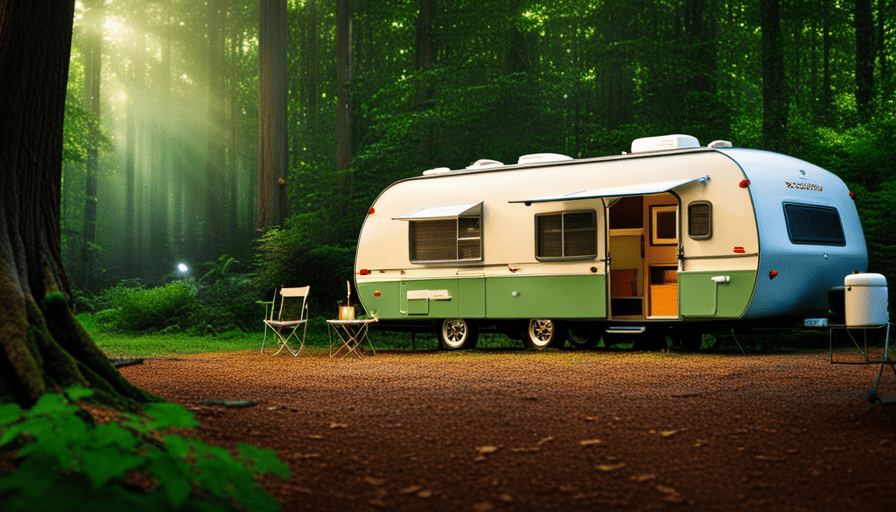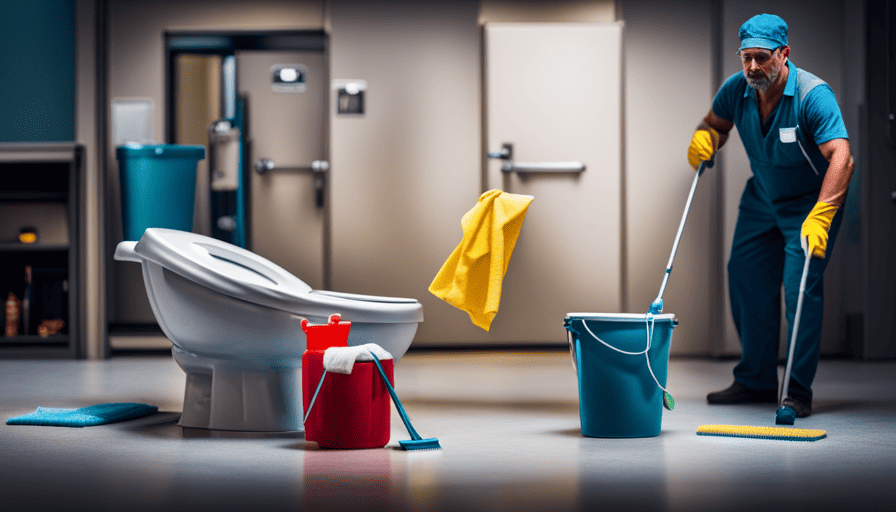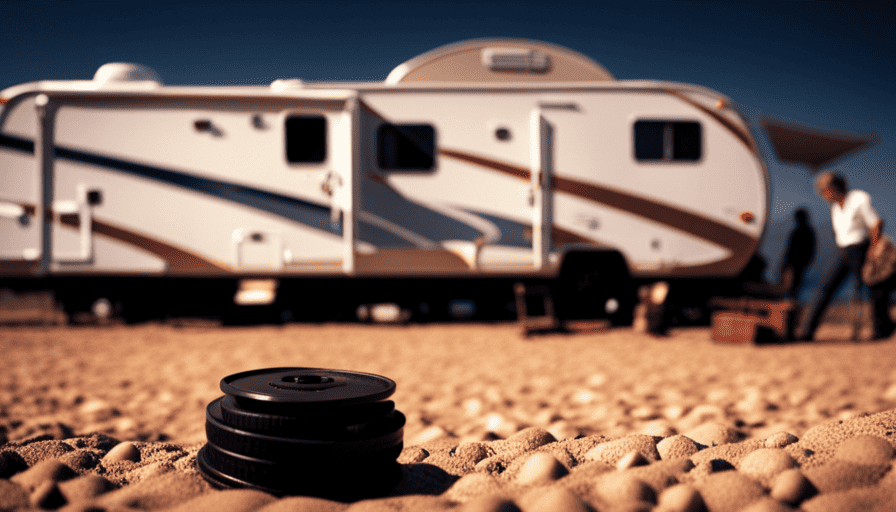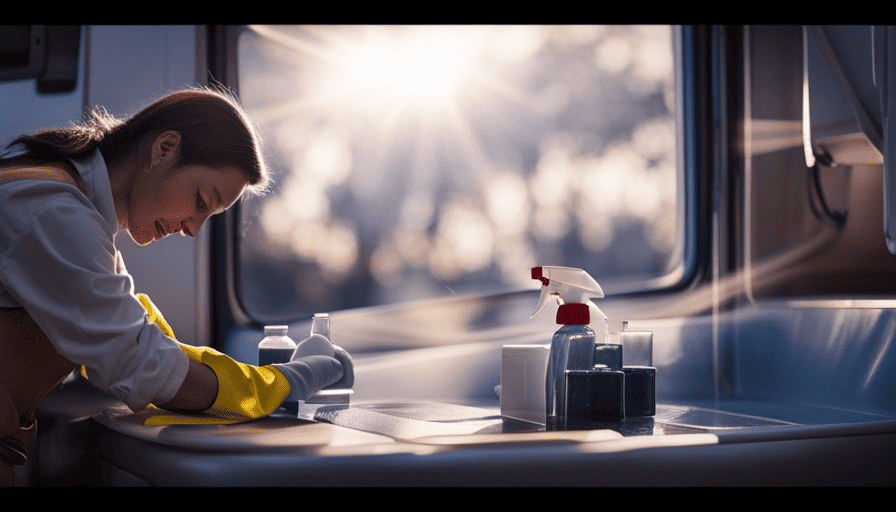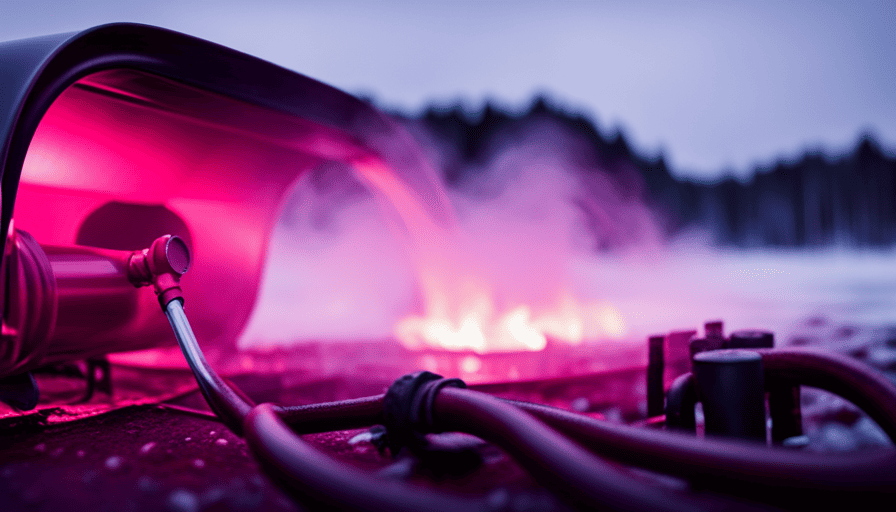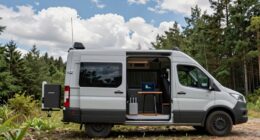Imagine yourself on a peaceful camping trip, enveloped by the beauty of nature, with a snug camper to retreat to. As the sun goes down and the air cools, you depend on propane to keep you warm and content.
But how long will your propane supply last? This article will delve into the factors that affect propane consumption in a camper, providing you with valuable information to estimate usage and conserve propane efficiently. With tips on monitoring propane levels, refilling and replacing tanks, as well as emergency preparedness and safety measures, you’ll be well-equipped to make the most of your propane supply.
So, whether you’re embarking on a weekend getaway or planning an extended adventure, join me on this informative journey as we explore the ins and outs of how long propane lasts in a camper. Get ready to enjoy the great outdoors without worrying about running out of fuel!
Key Takeaways
- Factors affecting propane consumption in a camper include cooking sessions, hot showers, and heater usage.
- Conserving propane while camping can be achieved through efficient appliance usage, insulation, and weatherproofing.
- Alternate heating and cooking methods such as solar power and wood-burning stoves can significantly reduce propane usage.
- Monitoring propane levels, finding refill stations, and following safety measures are crucial for continuous supply and longer-lasting propane during emergencies.
Factors Affecting Propane Consumption in a Camper
When camping in the wilderness, the amount of propane consumed in a camper depends on factors such as the length and intensity of campfire cooking sessions, the number of hot showers taken, and the frequency of using the heater to keep warm during chilly nights.
Propane is an essential resource for campers, providing fuel for cooking, heating, and even powering refrigerators. Understanding the factors that affect propane consumption is crucial for both estimating usage and ensuring propane safety.
Cooking sessions can have a significant impact on propane usage. The length and intensity of cooking can vary greatly depending on the number of meals prepared and the complexity of the recipes. Additionally, using propane-powered appliances, such as grills and stoves, can consume a considerable amount of fuel. Therefore, it’s important to plan meals and cooking sessions efficiently to minimize propane consumption.
Hot showers are another factor to consider. Taking frequent hot showers in a camper can quickly deplete propane reserves. The water heater consumes a significant amount of fuel to provide warm water for showers. It’s important to be mindful of the frequency and duration of showers to conserve propane.
Lastly, using the camper’s heater during chilly nights can also contribute to propane consumption. While staying warm is essential for a comfortable camping experience, it’s important to find a balance between comfort and conserving propane.
Estimating propane usage requires considering these factors and making informed decisions. By planning meals, showers, and heating sessions carefully, campers can optimize their propane consumption. Additionally, practicing propane safety measures, such as regularly checking for leaks and keeping propane tanks secure, is crucial.
Estimating Propane Usage
To estimate how much propane you have left in your camper, you can gauge your usage based on the frequency of your cooking and heating needs. Estimating propane usage involves calculating consumption and understanding the factors that affect it.
One way to estimate propane usage is by keeping track of how often you use your appliances that run on propane. For example, if you cook meals on a propane stove three times a day and use a propane heater for a few hours each night, you can estimate how long a tank of propane will last based on the size of the tank and the average consumption rate of your appliances.
Another method is to check the level of propane in your tank regularly. Most propane tanks have a gauge that indicates the amount of propane remaining. By comparing the current level with the total capacity of the tank, you can estimate how much propane you have left. However, keep in mind that the gauge may not always be completely accurate, so it’s a good idea to have a backup method of estimating propane usage.
By estimating your propane usage, you can plan ahead and ensure that you have enough propane for your camping trips.
In the next section, I’ll provide some tips for conserving propane, which can help you make your propane supply last longer.
Tips for Conserving Propane
When it comes to conserving propane while camping, there are a few key points to keep in mind. First, using appliances efficiently is crucial. This means only running them when necessary and being mindful of energy usage.
Second, insulation and weatherproofing can greatly impact propane usage. By ensuring your camper is well-insulated and sealed, you can keep the heat in and the cold out, reducing the need for propane heating.
Lastly, considering alternate heating and cooking methods can also help conserve propane. This could include using electric heaters or grills instead of relying solely on propane. By implementing these tips, you can make your propane supply last longer and enjoy your camping trip without worrying about running out.
Efficient Appliance Usage
Using propane in a camper is like having a magic fuel source that keeps your appliances running efficiently. To ensure that your propane lasts as long as possible, it’s important to practice efficient appliance usage.
One way to do this is by properly maintaining your appliances. Regularly cleaning and inspecting them can help maximize their efficiency and prevent any malfunctioning that could lead to propane waste.
Additionally, tracking your propane usage can give you a better understanding of how much fuel you’re consuming and allow you to adjust your habits accordingly. By being mindful of how often and how long you use each appliance, you can conserve propane and extend its lifespan.
This efficient appliance usage, combined with proper insulation and weatherproofing, will help you make the most out of your propane supply.
Insulation and Weatherproofing
Insulation and weatherproofing are essential for maximizing the efficiency of your appliances and conserving your propane supply. By properly insulating your camper, you can reduce heat loss during cold weather and keep your interior warm without overworking your propane-powered heater. Weatherproofing techniques, such as sealing gaps and cracks, can prevent drafts and moisture from entering your camper, ensuring that your appliances operate at their optimal level.
Here are five benefits of insulation and weatherproofing to consider:
- Improved energy efficiency
- Reduced propane consumption
- Enhanced comfort and coziness
- Prevention of condensation and mold growth
- Protection against extreme weather conditions
With these insulation and weatherproofing measures in place, you can make the most of your propane supply and extend its lifespan.
Now, let’s explore alternate heating and cooking methods to further enhance your camping experience.
Alternate Heating and Cooking Methods
One fascinating statistic to consider is that campers who utilize alternate heating and cooking methods can reduce their propane usage by up to 50%. This means that by exploring alternate fuel options and harnessing the benefits of solar power, campers can significantly extend the lifespan of their propane supply.
One popular alternative is using solar power to generate electricity for cooking and heating. Solar panels can be installed on the roof of the camper, capturing the sun’s energy and converting it into usable power. This not only reduces reliance on propane but also decreases the camper’s carbon footprint.
Additionally, campers can explore other fuel options such as wood-burning stoves or portable electric heaters. By incorporating these alternate methods, campers can conserve propane and extend their camping adventures.
Speaking of propane conservation, monitoring propane levels is crucial to ensure a continuous supply without interruptions.
Monitoring Propane Levels
Keep an eye on your propane levels, so you don’t run out of fuel during your camping adventures. Monitoring propane levels is essential to ensure you have enough fuel for cooking and heating in your camper.
One way to monitor propane levels is by using propane level indicators. These devices are attached to the propane tank and provide an accurate reading of how much propane is left. They come in different types, such as magnetic strips or digital gauges, and can be easily installed and read.
By regularly checking the propane level indicator, you can avoid unexpected fuel shortages and plan ahead for refilling or replacing your propane tanks.
Propane level indicators are especially useful when camping in remote areas where propane refill stations may not be readily available. By keeping track of your propane levels, you can estimate how long your supply will last and determine when it’s time to refill or replace your tanks. This ensures that you always have enough fuel for your camping needs and avoids any inconveniences during your trip.
Now, let’s move on to the next section and learn about refilling and replacing propane tanks.
Refilling and Replacing Propane Tanks
When it comes to refilling and replacing propane tanks for my camper, there are a few key points to consider.
First, finding propane refill stations is essential, as they provide a convenient and cost-effective way to replenish your supply.
Additionally, tank exchange programs can be a great option if you’re in a hurry or don’t have a refill station nearby.
Lastly, it’s crucial to handle propane tanks properly and follow safety measures to ensure a smooth and secure experience on your camping trips.
Finding Propane Refill Stations
If you’re in the mood for a wild goose chase, try hunting down a propane refill station for your camper. It can be a frustrating experience, but with a little research and patience, you can find the nearest propane station to keep your camper fueled up and ready to go.
Here are three things to consider when finding a propane refill station:
-
Location, location, location: Start by searching for nearby propane stations using online directories or apps. Look for stations that are conveniently located along your planned route or in the area where you’ll be camping.
-
Compare prices: Propane prices can vary between stations, so it’s worth comparing prices to ensure you’re getting the best deal. Some stations may offer discounts for bulk refills or loyalty programs, so keep an eye out for those.
-
Hours of operation: Check the operating hours of the propane stations you’re considering. It’s important to know if they are open when you plan to refill your tanks, especially if you’re traveling during non-standard hours.
Finding a propane refill station can be a bit of a challenge, but it’s a necessary step to keep your camper fueled and ready for your next adventure. Now, let’s talk about tank exchange programs.
Tank Exchange Programs
Don’t miss out on the convenience and peace of mind that tank exchange programs can bring to your camping experience. These programs allow you to easily swap out your empty propane tank for a full one at participating locations, eliminating the need to find and refill at a propane station. Not only does this save you time and effort, but it also ensures that you always have a fresh supply of propane for your camper.
When participating in a tank exchange program, it’s important to remember proper tank maintenance and propane safety. Always inspect the tank for any damage or leaks before exchanging it. Additionally, make sure to follow proper handling and safety measures when connecting and disconnecting the propane tank from your camper. By taking these precautions, you can enjoy a worry-free camping experience with a steady and reliable propane supply.
Now, let’s move on to the subsequent section about proper handling and safety measures when using propane in your camper.
Proper Handling and Safety Measures
After discussing tank exchange programs, let’s now delve into the importance of proper handling and safety measures when it comes to propane in your camper.
As an experienced camper, I can’t stress enough the significance of understanding the appropriate storage, maintenance, and inspection procedures for propane tanks. Firstly, it’s crucial to store propane tanks in a well-ventilated and secure location, away from any potential sources of ignition.
Regularly inspect the tanks for any signs of damage or leaks, such as corrosion or hissing sounds. Additionally, make sure that all connections are tight and properly sealed.
Proper maintenance includes checking the expiration date of your tank and having it re-certified when necessary. By following these guidelines, you can minimize the risk of accidents and ensure the safe use of propane in your camper.
Now, let’s move on to discussing emergency preparedness and safety.
Emergency Preparedness and Safety
When it comes to emergency preparedness and safety, it’s crucial to ensure that your propane supply in the camper lasts for an extended period of time. In case of a power outage or natural disaster, having a sufficient amount of propane can provide you with heat, hot water, and the ability to cook meals.
Here are three important factors to consider for emergency preparedness and propane storage:
-
Propane Tank Size: The size of your propane tank will determine how long it will last. Larger tanks can hold more propane and provide a longer-lasting supply. It’s recommended to have a tank size that can sustain your needs for at least a few weeks.
-
Regular Inspections: It’s important to regularly inspect your propane tank for any signs of damage or leaks. Look for rust, dents, or loose fittings. A damaged tank can pose a safety risk and may result in a shorter lifespan for your propane supply.
-
Proper Ventilation: Adequate ventilation is crucial when storing propane. Propane should always be stored in a well-ventilated area to prevent the buildup of potentially dangerous fumes. Make sure your propane storage area is properly ventilated and free from any ignition sources.
By considering these factors and following proper safety measures, you can ensure that your propane supply in the camper will last for an extended period of time, providing you with the essential resources during emergency situations.
Frequently Asked Questions
Can I use propane for cooking inside my camper?
Yes, you can use propane for cooking inside your camper, but it’s important to prioritize propane safety and follow proper ventilation requirements. Propane is commonly used for cooking in campers because of its convenience and efficiency. However, it’s crucial to ensure that your camper has adequate ventilation to prevent the buildup of dangerous carbon monoxide gas. Always make sure to keep windows or vents open while cooking to maintain a safe environment.
What is the average lifespan of a propane tank for a camper?
On average, the lifespan of a propane tank for a camper is about 12 years. That’s equivalent to 4,380 days of reliable fuel supply for your adventures on the road.
It’s important to keep in mind that regular maintenance and inspections are crucial to ensure the tank’s safety and longevity. Propane tanks have a built-in pressure relief valve that helps prevent over-pressurization, making them a reliable and efficient choice for cooking and heating inside your camper.
How often should I check for propane leaks in my camper?
Proper maintenance of your camper includes regularly checking for propane leaks to ensure the safety of you and your family. It is recommended to inspect the propane system at least once a month, paying close attention to the connections, hoses, and fittings.
To do this, create a soapy water solution and apply it to these areas. If you see bubbles forming, it indicates a leak. Remember, safety precautions are paramount when dealing with propane, so always turn off the gas supply before conducting any inspections.
Is it possible to convert a camper from propane to electric appliances?
Oh, the joys of converting a camper from propane to electric appliances! Let me tell you, it’s quite the adventure.
The conversion process involves removing the existing propane appliances and replacing them with electric ones. The benefits? Well, say goodbye to those pesky propane leaks and the need to constantly check for them. Plus, electric appliances are generally more energy-efficient.
However, there are drawbacks too. You’ll need a reliable source of electricity, and you might miss that cozy, propane-powered campfire vibe.
Are there any regulations or restrictions for transporting propane tanks for campers?
When it comes to transporting propane tanks for campers, there are a few regulations and restrictions that need to be followed. It is important to check with your local transportation authority for specific guidelines, but generally, tanks must be properly secured and stored in an upright position. They should also be kept away from any sources of ignition or heat.
Additionally, there may be restrictions on the quantity of propane that can be transported at one time. It’s crucial to adhere to these regulations to ensure the safety of yourself and others on the road.
Is There a Difference in Propane Tank Lifespan Based on the Type of Camper?
Is there a difference in propane tank lifespan in campers based on the type of camper? The lifespan of a propane tank in a camper can vary depending on factors such as usage, maintenance, and the type of camper. Smaller campers often have smaller propane tanks, which may require more frequent refills. However, larger campers with larger tanks can hold more propane, potentially lasting longer between refills. Ultimately, proper care and regular maintenance are key to prolonging the propane tank lifespan in any type of camper.
Conclusion
So, in conclusion, it’s important to consider various factors when estimating how long propane will last in a camper. The size and efficiency of appliances, weather conditions, and personal usage habits all play a role in propane consumption.
By implementing conservation tips such as using propane sparingly, insulating the camper, and utilizing alternative energy sources, you can extend the duration of your propane supply.
Regularly monitoring propane levels and having a plan for refilling or replacing tanks ensures a constant supply. Remember, it’s always better to be prepared and safe when it comes to propane usage, especially when hitting the road.
As the saying goes, ‘A stitch in time saves nine.’

